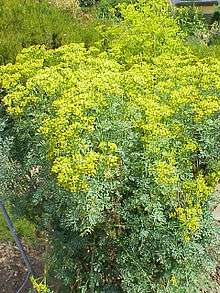rue
English
Pronunciation
- IPA(key): /ɹuː/
- Rhymes: -uː
- Homophone: roo
Etymology 1
From Middle English rewe, reowe, from Old English hrēow (“sorrow, regret, penitence, repentance, penance”), from Proto-Germanic *hrewwō (“pain, sadness, regret, repentance”), from Proto-Indo-European *krew-, *krow-, *krows- (“to push, fall, beat, break”). Cognate with Scots rew (“rue”), West Frisian rouw (“sadness”), Dutch rouw (“mourning, sadness”), German Reue (“repentance, regret, remorse, contrition”), Lithuanian krùšti (“to smash, crash, bruise”), Russian крушить (krušitʹ, “crush”).
Noun
rue (uncountable)
- (archaic or dialectal) Sorrow; repentance; regret.
- (archaic or dialectal) Pity; compassion.
Derived terms
Translations
|
|
|
|
Etymology 2
From Middle English rewen, ruwen, ruen, reowen, from Old English hrēowan (“to rue; make sorry; grieve”), perhaps influenced by Old Norse hryggja (“to distress, grieve”)[1], from Proto-Germanic *hrewwaną (“to sadden; repent”). Cognate with Dutch rouwen, German reuen.
Verb
rue (third-person singular simple present rues, present participle ruing or rueing, simple past and past participle rued)
- (obsolete, transitive) To cause to repent of sin or regret some past action.
- (obsolete, transitive) To cause to feel sorrow or pity.
- (transitive) To repent of or regret (some past action or event); to wish that a past action or event had not taken place.
- I rued the day I crossed paths with her.
- (Can we date this quote?) Chapman
- I wept to see, and rued it from my heart.
- 1667, John Milton, Paradise Lost, Book 4:
- Thy will chose freely what it now so justly rues.
- 2009, David Theo Goldberg, The Threat of Race:
- And feminization of the homeland is something to be rued, while the feminized humiliation of the enemy for the sake of the fatherland is cause for commendation and celebration.
- 2009, Erica James, It's The Little Things:
- As far as they were concerned, he must be ruing the day he ever met Sally.
- 2012, Joy Fielding, Still Life:
- And was the fact she was no longer losing large chunks of time something to be celebrated or something to be rued?
- 2014, Gary Meehan, True Fire:
- “If we get in a fight, you'll be ruing your lack of training.”
- (archaic, intransitive) To feel compassion or pity.
- Late 14th century Geoffrey Chaucer, ‘The Franklin's Tale’, Canterbury Tales
- Madame, reweth upon my peynes smerte
- (Can we date this quote?) Ridley
- which stirred men's hearts to rue upon them
- Late 14th century Geoffrey Chaucer, ‘The Franklin's Tale’, Canterbury Tales
- (archaic, intransitive) To feel sorrow or regret.
- (Can we date this quote?) Tennyson
- Old year, we'll dearly rue for you.
- (Can we date this quote?) Tennyson
Usage notes
- Often used in the collocation “rue the day”.
Translations
Etymology 3

From Middle English rue, from Anglo-Norman ruwe, Old French rue (> modern French rue), from Latin rūta, from Ancient Greek ῥυτή (rhutḗ). Compare rude.
Noun
rue (plural rues)
- Any of various perennial shrubs of the genus Ruta, especially the herb Ruta graveolens, formerly used in medicines.
- 1590, Edmund Spenser, The Faerie Queene, III.2:
- But th'aged Nourse, her calling to her bowre, / Had gathered Rew, and Savine, and the flowre / Of Camphora, and Calamint, and Dill [...].
- c. 1600, William Shakespeare, Hamlet, Act 4, Scene 5, Ophelia:
- There’s fennel for you, and columbines: there’s rue for you; and here’s some for me: we may call it herb-grace o' Sundays: O you must wear your rue with a difference.
- 1590, Edmund Spenser, The Faerie Queene, III.2:
Synonyms
- garden rue
- herb of grace
Derived terms
- goat's rue
- rue anemone
- Syrian rue
- wall rue
Translations
|
|
References
- “rue” in Douglas Harper, Online Etymology Dictionary, 2001–2019.
Chuukese
French
Pronunciation
- IPA(key): /ʁy/
audio (une rue) (file)
Etymology 1
From Old French rue, developed figuratively from Latin rūga (“wrinkle”), from Proto-Indo-European *krewp- (“to become encrusted”), extension of *krew- (“scab”)
Etymology 2
From Old French rue, rude, from Latin rūta, from Ancient Greek ῥυτή (rhutḗ).
Etymology 3
From ruer
Verb
rue
Further reading
- “rue” in le Trésor de la langue française informatisé (The Digitized Treasury of the French Language).
Kabuverdianu
References
- Gonçalves, Manuel (2015) Capeverdean Creole-English dictionary, →ISBN
Latin
Middle English
Etymology
Borrowed from Anglo-Norman ruwe, from Latin rūta, from Ancient Greek ῥυτή (rhutḗ).
Pronunciation
- IPA(key): /ˈriu̯(ə)/
- Rhymes: -iu̯(ə)
Noun
rue
- A kind of plant belonging to the genus Ruta; rue.
- (rare) meadow-rue (plants in the genus Thalictrum)
References
- “rūe (n.)” in MED Online, Ann Arbor, Mich.: University of Michigan, 2007, retrieved 2018-06-7.
Norman
Etymology
From Old French rue, developed figuratively from Latin ruga (“wrinkle”).
Pronunciation
Audio (Jersey) (file)
Norwegian Nynorsk
Alternative forms
Pronunciation
- IPA(key): /²rʉːə/
Synonyms
Old French
Alternative forms
Etymology
From Latin rūta, from Ancient Greek ῥυτή (rhutḗ).
References
- Godefroy, Frédéric, Dictionnaire de l'ancienne langue française et de tous ses dialectes du IXe au XVe siècle (1881) (rue, supplement)
- rue on the Anglo-Norman On-Line Hub